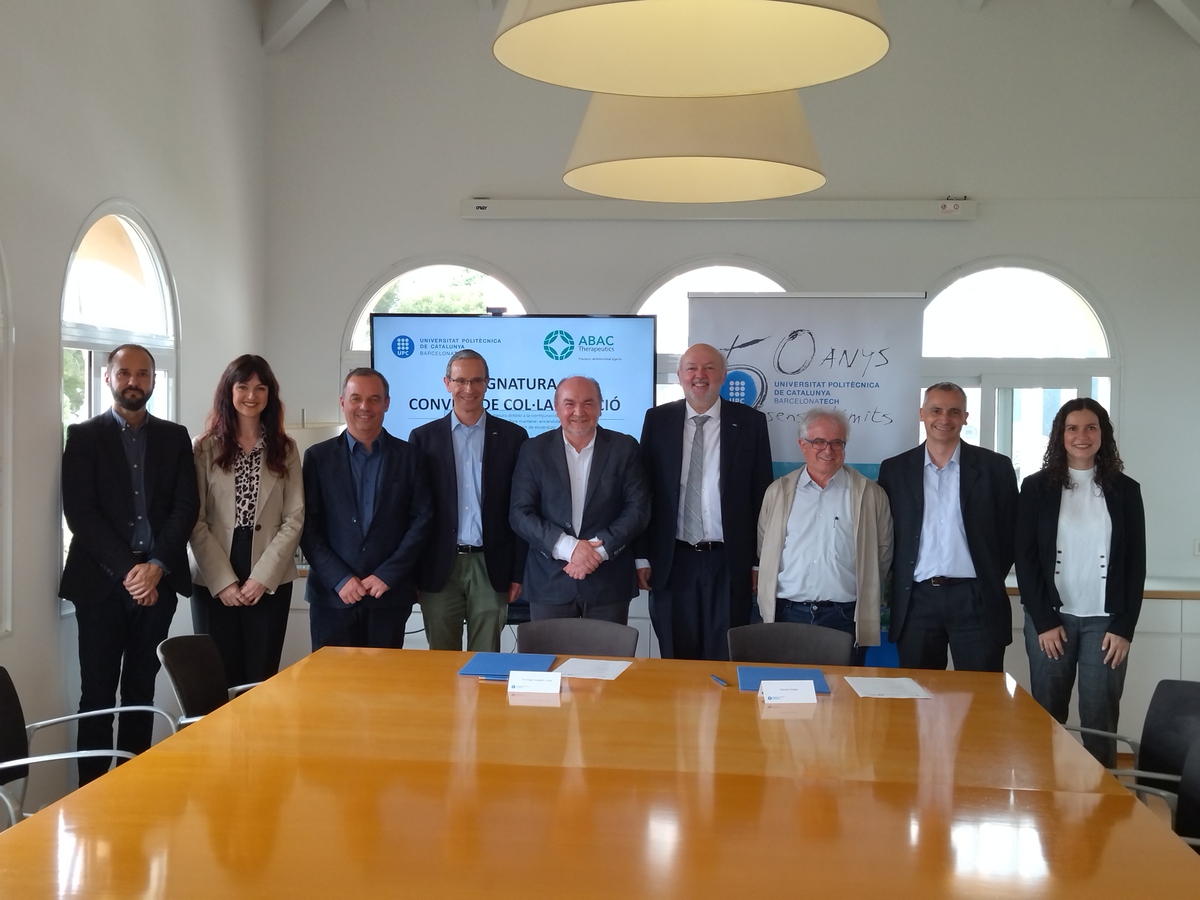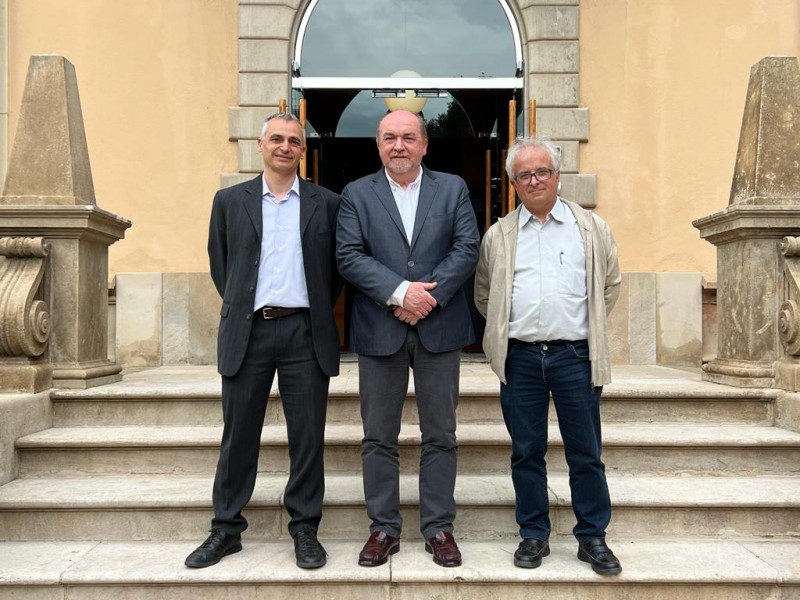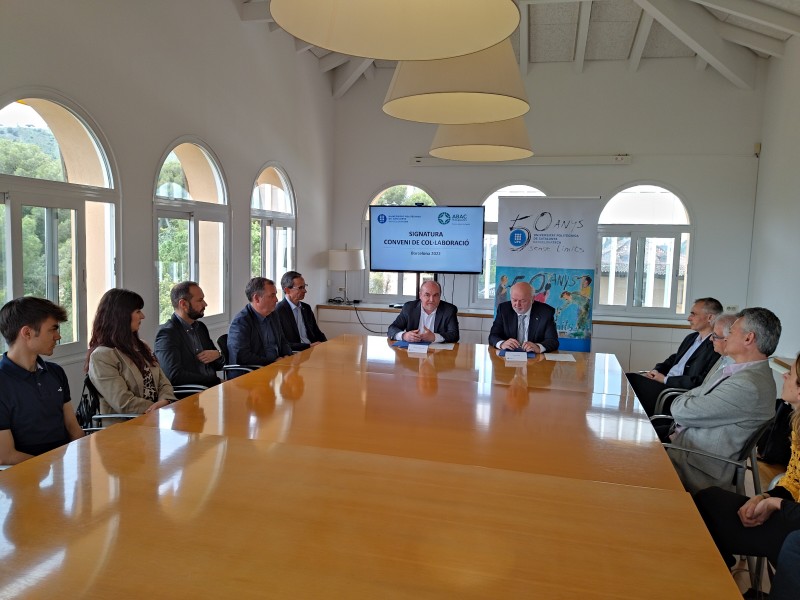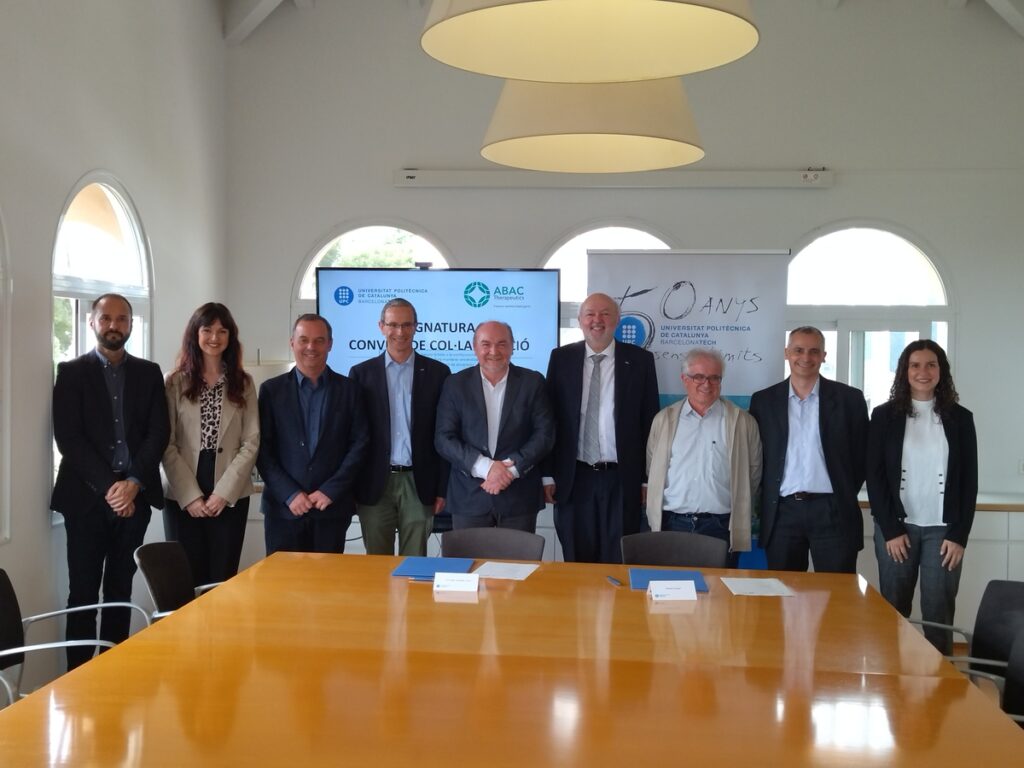The collaboration will allow advancing research against what is already considered the next pandemic
- ABAC Therapeutics, a leading company in the research of new antibiotics, collaborates with the BIOCOM-SC research group and inLab FIB laboratory of the Universitat Politècnica de Catalunya · BarcelonaTech (UPC) to develop computer tools focused on discovering antibiotics of specific activity or reduced spectrum, designed to selectively attack pathogenic microorganisms
- Antibiotics with selective activity will be respectful of human bacterial flora (microbiome) and the microbiological biodiversity of natural systems. In addition, these innovative drugs will allow fighting against multiresistant microorganisms from a novel approach, based on precision medicine
- The alliance has materialized with the signing of a collaboration agreement between both entities

Signing of the collaboration agreement between both entities
Barcelona, 28th of April of 2022.- The resistance of bacteria to antimicrobial agents poses one of the greatest threats to global health and economic development. According to data from the World Health Organization (WHO), multiresistant bacteria cause 33,000 deaths per year in Europe, and it is estimated that, by 2050, they will be the leading cause of mortality in the world, charging more than 10 million lives annually.
A growing number of infections, such as pneumonia, tuberculosis, septicemia or gonorrhea, are increasingly difficult to treat due to the ability of bacteria to mutate in response to the indiscriminate use of antibiotics, which end up losing their effectiveness. Antibiotic resistance is a natural phenomenon, although the improper use of these drugs is accelerating the process. A phenomenon that, in addition, supposes in Europe an additional sanitary expenditure of about 1,500 million euros per year.
A study recently published in ‘The Lancet’ indicates that, in 2019, around five million people died from causes related to bacterial resistance to antibiotics, of which, 1.3 million deaths, could be directly attributed to this phenomenon. It is not, therefore, a future, but a problem that must be faced today. Experts assure us that we are facing a “great silent pandemic”, and urge urgent investment in the discovery of new antibiotics and using existing ones more appropriately.
Currently, the most widely cited antibiotics are called broad-spectrum antibiotics: drugs that attack indistinctly a wide diversity of bacteria without establishing differences between pathogenic species and bacteria native to the human microbiome and natural ecosystems, favoring the generation of resistance and a negative impact on the environment.
The loss of effectiveness of broad-spectrum antibiotics, coupled with the lack of advances in the search for these compounds in recent decades, which last milestone dates from 1962, has led ABAC Therapeutics, in collaboration with the group of Computational Biology and Complex Systems (BIOCOM-UPC) and inLab FIB UPC –the innovation and research laboratory of Facultad de Informática de Barcelona (FIB) of UPC– to implement a new paradigm in the treatment of infectious diseases based on precision medicine. From this new approach, it is moving forward the discovery of antibiotics with selective or reduced spectrum activity, more effective and with less environmental impact.
“Without new antibiotics capable of facing the threat posed by multiresistant bacteria, many of the advances made by medicine in this last century will cease to be effective, which will push us back in time to times prior to the discovery of penicillin. Not too long in the future, any slight infection could cause deaths, which is why this change of direction in research is so important.”, has explained Domingo Gargallo-Viola, CEO and co-founder of ABAC Therapeutics.
Analyzing hundreds of thousands of molecules
The public-private partnership between ABAC Therapeutics and the UPC aims to identify new compounds with specific activity, respectful of human bacterial flora, effective against organisms resistant to current antibiotics. Specifically, BIOCOM-UPC will develop mathematical methods to process the results obtained after the evaluation of hundreds of thousands of compounds bagged in different in vitro experiments. This innovative platform, based in the algorithm PasNas (Pathogen Specific-Narrow Spectrum), allows prioritizing compounds with an adequate set of properties, including antimicrobial activity and absence of toxicity in cell lines and zebra fish embryos, necessary requirements to progress towards the next phases of experimentation, thus increasing the probabilities of success to achieve new antibiotics capable of combating this “silent pandemic”.
The research is led by Dr. Domingo Gargallo-Viola, from ABAC, and researchers Daniel López-Codina, from BIOCOM-UPC, and Albert Obiols, head of Data Science and Big Data at inLab FIB.

From left to right, Albert Obiols, Dr. Domingo Gargallo-Viola and Daniel López-Codina
Daniel López-Codina has highlighted that “The proliferation of drug-resistant, multi-resistant and extensively drug-resistant bacteria, viruses, parasites and fungi is clearly one of the most important challenges in healthcare. It is a privilege to be able to work with Dr. Domingo Gargallo-Viola, one of the best specialists in the search for specific antibiotics or antimalarials and to contribute our knowledge to meet this challenge. In the BIOCOM-UPC group we have been working in microbiology for decades and this allows us to understand the experimental work of ABAC Therapeutics, making it possible to introduce the quantitative perspective. We have developed methodology to transform the results of the experimental work into indices and parameters in order to facilitate the selection of molecules that offer possibilities of being of interest”.
For his part, Albert Obiols explained that “The project is very ambitious and represents an important challenge with a clear social responsibility. Without an intensive analysis of the data obtained in the laboratory, it would be very difficult to reach any conclusions. This is inLab FIB’s contribution to the project and demonstrates the need to apply informatics to obtain innovative solutions: we are delighted to be able to help make decisions in a field so different from our own through data analysis and visualization.”
This alliance was materialized at the official signing ceremony of the agreement, which was attended by Domingo Gargallo-Viola; Daniel López-Codina, researcher at the BIOCOM-UPC; Albert Obiols, proyecto ABAC responsible in inLab FIB; Ernest Teniente, director of inLabFIB; Josep Fernández Ruzafa, dean of FIB, and Daniel Crespo, rector of UPC.

Fight against malaria, origin of the collaboration
The collaboration of the microbiologist Domingo Gargallo-Viola with BIOCOM-UPC research group dates back to 2010: specifically, to a project for the search of antimalarial drugs that resulted in a doctoral thesis, prepared by Jordi Ferrer Savall, under the direction of Daniel López-Codina and Joaquim Valls. There was analysed how to optimize the protocols to make in vitro cultivation of infected cells by Plasmodium falciparum, one of the parasites that cause malaria, key to the development of new drugs. The thesis won the second prize in the competition for the best doctoral thesis in science, organized by the Conference of Rectors of Madrid Universities (CRUMA), in 2011.
